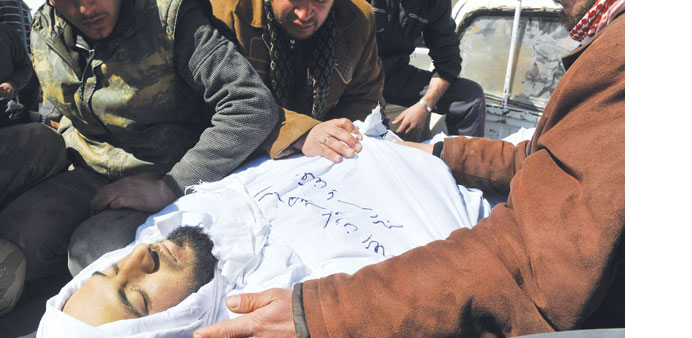Grieving residents carry the body of an opposition fighter who was killed during clashes with Syrian army soldiers in Maarat Al-Numan, in the northwestern province of Idlib.
Reuters/Beirut
Both sides in Syria’s conflict yesterday demanded an international inquiry into a deadly attack they each cite as evidence that the other has used chemical weapons.
The deaths of 26 people in a rocket attack on a northern town on Tuesday have become the latest focus of a propaganda war between President Bashar al-Assad’s supporters and opponents, who accuse each other of firing a missile laden with chemicals.
The United States and Russia, which back opposing sides in Syria, took contrasting views of the strike on Khan Al-Assal, near Aleppo, which, if confirmed, would be the first use of chemical weapons in the two-year-old conflict.
Robert Ford, the US ambassador to Damascus who left Syria more than a year ago, said his government had no evidence so far to substantiate reports that chemical weapons munitions had been used in Syria on Tuesday.
“But I want to underline that we are looking very carefully at these reports,” he added, in testimony in Washington to a US House of Representatives hearing on the crisis in Syria.
Ford also said there would be consequences for Syria’s government if it were found to be using chemical weapons, but would not discuss what those would be.
Washington has so far shunned direct military intervention in Syria, although it says Assad must be removed from power after 43 years of his family’s iron rule and two years after the start of an uprising against it.
Syria’s restrictions on independent media and foreign aid groups make it hard to verify what happened, but survivors interviewed in hospitals complained of breathing difficulties.
The opposition Syrian National Coalition said it wanted an international investigation into alleged chemical attacks in both Khan Al-Assal and Otaiba, a town near the capital Damascus.
“The Coalition would like all parties and individuals involved in this reprehensible crime to be brought to justice,” it said in a statement.
Syria’s Foreign Ministry has asked UN Secretary-General Ban Ki-moon to set up an independent, neutral specialist technical team “to investigate the use of chemical weapons by the terrorists in Khan Al-Assal,” state television reported.
Deputy Foreign Minister Faisal Meqdad had said on Tuesday that officials would test soil and rocket debris in Khan Al-Assal and report their findings to the “relevant bodies”.
The World Health Organisation said it would send medical supplies to Aleppo but could not verify if chemical agents had been used. Experts contracted by the UN agency will visit Aleppo health facilities to identify immediate health needs and provide support for treatment of toxins, it said.
Syria’s military has turned increasingly heavy weapons on those opposing Assad’s rule, using firearms, then tanks, artillery, aircraft and long-range missiles, but it has denied it would use chemical weapons.
The most notorious chemical weapons attack in the Middle East was in the Iraqi Kurdish city of Halabja, where some 5,000 people died in a strike ordered 25 years ago by then-Iraqi leader Saddam Hussain. Colonial power Britain had earlier used poison gas to quell revolts in Iraq and elsewhere in the region.
But there has been little hard evidence that Tuesday’s attacks involved chemical munitions, some weapons experts say.
David Friedman, a former specialist on weapons of mass destruction with Israel’s Defence Ministry, said he did not believe chemical weapons had been used in the Khan Al-Assal attack, citing witness testimony and television footage.

